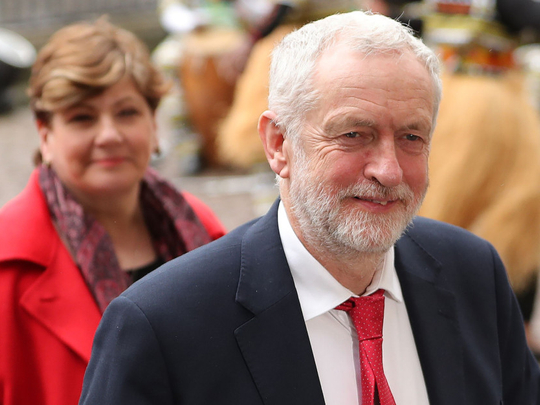
Anyone who is certain that the Tories can’t beat Jeremy Corbyn must first account for the fact that they have done so once already. To many ears, that is a perverse interpretation of last year’s election. The Conservative campaign was a flop that cost the party its majority and enfeebled its leader. Corbyn emerged stronger than Theresa May in many ways.
But May emerged as Prime Minister, which is a legitimate measure of victory. The question of a rematch is, anyway, academic. No Tory MP wants one, and a general election isn’t obligatory before 2022. An assumption that May will stand aside before then is a reason why she is still in the job. The Conservative leader is on a conditional licence from her party to stick around long enough to sign off on Brexit, and not much longer.
That licence is under constant review. There could be a tricky renewal period after local elections this spring. The Tories are braced for particularly harsh treatment at the hands of London voters. Boroughs once seen as true-blue bastions could fall. That confirms a feeling in Westminster that Labour has the wind at its back.
There are reasons to read the political weather this way. Corbyn’s forces are disciplined and energetic; May’s are haggard and unruly. The path to Brexit is strewn with impossible choices to torture a governing party. Add austerity’s toll on public services, plus other accrued resentments of a long Tory incumbency, and it is easy to imagine Britain reaching an election desperate for regime change. Intuitively it feels as if Labour is riding the natural swing of the pendulum.
But opinion polls don’t reliably support that intuition. Labour has the lead in some surveys, others put it and the Tories level in the margin of error. On the question of who would be a better prime minister, May beats Corbyn. “Don’t know” sometimes knocks him into third. Polls are not prophecy, but when the Tories think their leader is a spent force, it is curious that many voters still prefer her, or literally anyone else, to the Labour candidate.
One explanation to comfort Corbyn’s supporters is that his image has been compromised by ferocious denigration in much of the media. Also, he was injured at the start of his journey by sabotage from within his party. That was true once, but the period when Labour MPs flaunted contempt for their leader is over. There are pockets of dissent, especially around Brexit policy, but thoughts of replacing Corbyn have been snuffed out.
Also consigned to the past is the habit of gratuitous presentational blunders. Corbyn now dresses like a potential prime minister. He would sing the national anthem if required. He has learnt to give interviews without accidentally committing news. He no longer spills out half-formed policy thoughts for his enemies to use against him. Even before Corbyn’s professionalisation, the frenzied campaigns against him proved counterproductive. His polite, avuncular demeanour never aligned with newspaper portrayals of a terrorist-idolising, treasonous maniac. A mismatch between the man people see and the one they are told they are looking at allows Corbyn some benefit of the doubt. It also confirms ultra-loyalists in their view that any criticism is a vindictive smear.
That faith is resilient to evidence of flaws in the Labour leader’s character. Last week, it was shown beyond doubt that Corbyn had been an active member of a private Facebook group contaminated by poisonous conspiracy theories. His own posts were clean of the toxin but it is hardly credible that he could stand so deep in a sewer without noticing any smell. Yet that is what his office claims.
The questions this raises about Corbyn’s judgement and the company he keeps are not new. The only people still bothering to ask are his old critics whose views have no purchase with his supporters. In Labour circles, the integrity of the opposition leader is a polarised issue; a quasi-theological schism whose contours are shaped by older feuds; over Blairism, Iraq, what is truly “the left”.
Much of British politics is a battle between rival ideas of Jeremy Corbyn, only loosely tethered to the actual Jeremy Corbyn. One tends to absolute wickedness, the other to infallible virtue. Neither has much resonance with the wider public. This, I suspect, is a factor in the polling stalemate. Many kilojoules of political energy have been spent arguing about whether the Corbynite takeover of Labour is a calamity or a blessing. That debate has not illuminated what Corbynism means for people who don’t read manifestos or argue about politics on Twitter. So — most people.
Corbyn’s own words are remarkably forgettable for a man who fires such partisan passions. He has made countless speeches since 2015. Audiences loved each one, yet none is cherished or reread as the key to his creed. He is the centre of a phenomenon, but not its author. He is much better at politics than his critics foresaw, but also much more like an ordinary politician than his fans claimed.
Between one side’s idolatry and the other’s demonisation there is a spectrum of conventional competence against which the Labour leader is barely assessed. He might get to Downing Street never having faced that scrutiny. A Tory implosion, Brexit cataclysm or both are feasible this year. Gravity seems to be on the opposition’s side. The Tories themselves seem to be weighed down by a feeling that the pendulum is moving against them. What no one really knows yet is how a credible prospect of Corbyn becoming prime minister — the real Corbyn, not the myth — will affect the swing.
— Guardian News & Media Ltd
Rafael Behr is a Guardian columnist.










